Google Core 2020 Updates: See the Bigger Picture
Google’s core updates include significant changes in its algorithm that impact many websites and industries. Every change is designed to improve the user experience. Website performance optimization is mandatory each time an update is more noticeable, especially when it’s a core update. You should align your website with the new regulations to stay high in your Google rankings and avoid potential issues with Google Discovery.
Follow along to get the overall picture of Google Core 2020 updates, the ways your website might have been affected, and what you should do when Google updates are released.
What is Google Search Algorithm?

Google algorithm is a complex system that fetches data from the Google search index and delivers the best results for a search query. The search engine runs a combination of small algorithms and diverse ranking factors to display sites ranked by relevance on the search engine results page (SERP).
In the early years, Google released just a few algorithm updates per year. Nowadays, Google makes thousands of changes. The majority of these updates go unnoticed, as the changes are insignificant. However, several times a year, Google rolls out broad algorithm updates that significantly impact how websites perform in the SERP.
What is a Google Core Algorithm Update?

Over the years, Google has released a long list of broad core updates that changed how websites rank and how they are presented on the results page. The core ranking algorithm update is designed to improve the relevance of the search results for a better user experience and support high-quality content sites that failed to show up on the SERP. The broad core algorithm update is broadly noticeable and has a significant impact on websites. You may notice fluctuations in ranking position for specific search queries on a global level. If a website is affected by a previous core update, the only fix is to improve the content quality. The broad core updates are rolled out several times a year. Usually, they take place quarterly.
Google Core 2020 Updates: What Happened?
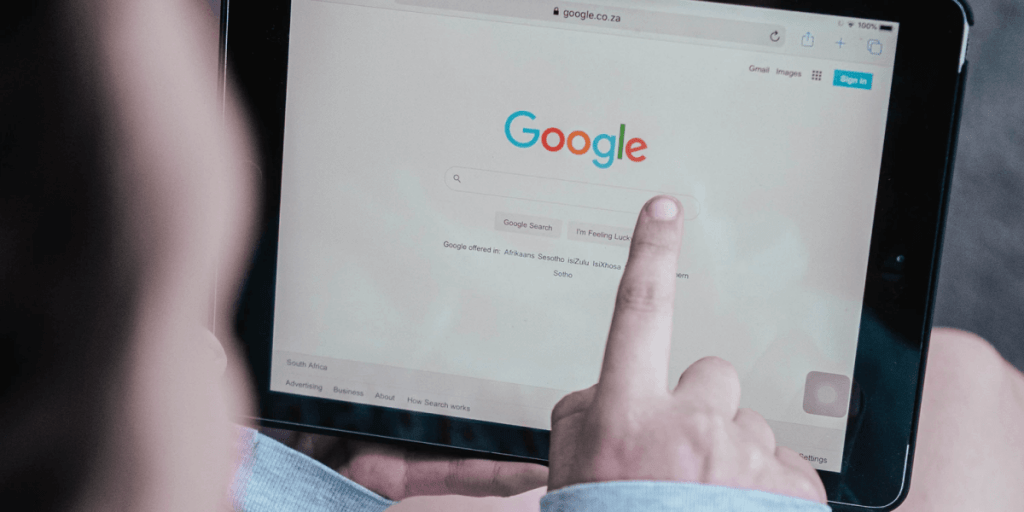
During the year 2020, Google rolled out three core updates: one in January, one in May, and the last one in December. Let’s explore each one further:
January 2020 Core Update
On 13th January, Google announced via Twitter a broad core algorithm update called the January 2020 Core Update. Given that the January 2020 core update was a broad core update, it impacted all Google search results on a global scale. It was not focused on something specific like the “Speed Update”, for example, which can be improved immediately. Google recommended reading this article from the Google Search Central Blog and other blog posts from third parties that explain how they used Google’s guidelines to align to the new algorithm changes. To better understand how this core update operates, Google made a clear and easy to understand analogy: you made a top 100 movies in 2015, and in 2019 you refresh the list that will naturally change due to new, awesome movies that did not exist before. Therefore, you might reassess some movies in higher positions and add new worthy films to your list.
To translate this analogy, if you ranked well for a specific set of keywords based on user search queries, new keywords are of interest. As a result, websites with their content optimized for the new set of keywords will rank higher than you, but this does not mean that your SEO optimizations are bad. There is nothing wrong with your website pages that drop in ranking after a core update. They just need the content to be adjusted to the new search trend.
The January 2020 core update penalized thin content, and Google emphasized YMYL (Your Money, Your Life). Your Money, Your Life content is the information that could impact the reader’s happiness, safety, health, or even financial stability when presented inaccurately, misleading, and untruthful. YMYL topics cover news and events on topics such as business, technology, science, and politics; government, laws, and civics (voting, social services, legal issues); financial advice (taxes, retirement, stock market investments, loans, etc.); shopping (researching purchases); medical advice (drugs, hospitals, emergencies, diseases, etc.); information on people belonging to a particular race, nationality, sexuality, religion, ethnicity, etc.
According to RankRanger, “There is massive movement at the top of the SERP for the Health and Finance niches and incredible increases for all niches when looking at the top 10 results overall.” Below you can see the rank volatility by industry and the position of the ranking industries.
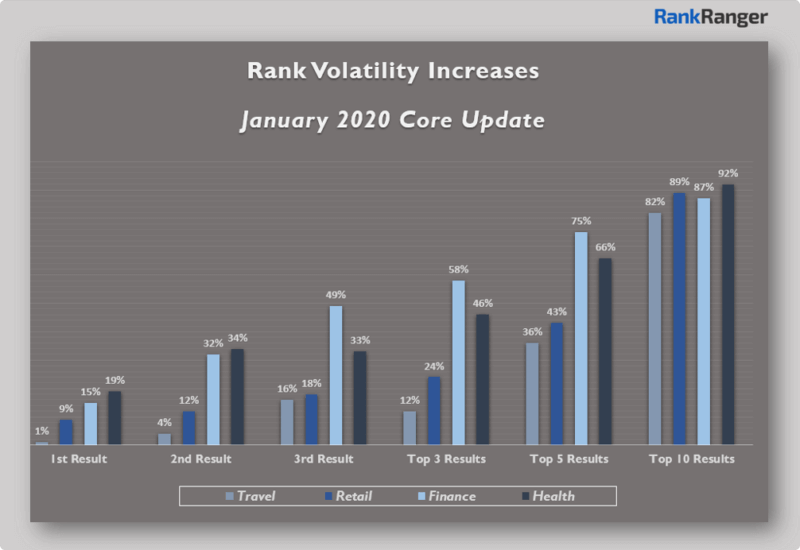
After a core update, dramatic drops or gains in search rankings are expected so paying attention to your rankings is recommended. If your rankings decline, we suggest providing a more comprehensive search experience.
May 2020 Core Update
The second broad core algorithm was announced on May 4th on Twitter, and it is called the May 2020 Core Update. Like the previous updates, this included major algorithm updates that implied drastic changes since that time. Even if it took almost two weeks to roll out fully, between 4th and 6th May, the SEO community could notice that it had a pretty significant impact. The Google core update brought unprecedented SERP volatility, as you can see on the SEMrush Sensor graph below.
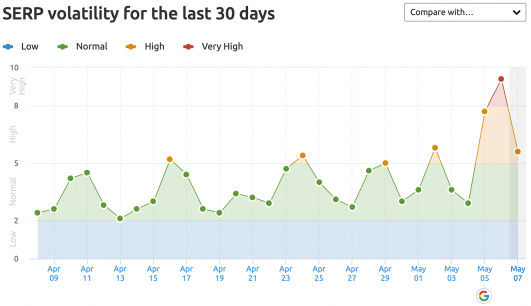
The January core update led to average volatility of 8 points, the May update, in only two days, the peak volatility rates were between 9 and 9.4 points for every category. Therefore, this new update would have a more significant impact on SERPs and rankings.
Being a broad core algorithm update, noticeable changes took place within search results across all languages and countries. It was imminent to see ranking drops and gains after the update fully rolled out. Travel, tourism, live events types of sites registered a significant reduction in user queries giving the pandemic. Therefore, the volatility did not come as a surprise for these categories.
But those are not the only industries that the May update had an impact upon. The most affected sectors were travel, real estate, health, pets and animals, and people and society for mobile and desktop searches. The winning industries were business, industrial, internet, telecom, beauty, and fitness.
December 2020 Core Update
Exactly as the previous announcements, in the morning of December 3rd 2020, Google announced on Twitter the December 2020 core update rollout. This was the third core update released in 2020, and according to RankRanger, this update had a more significant impact than the May update.
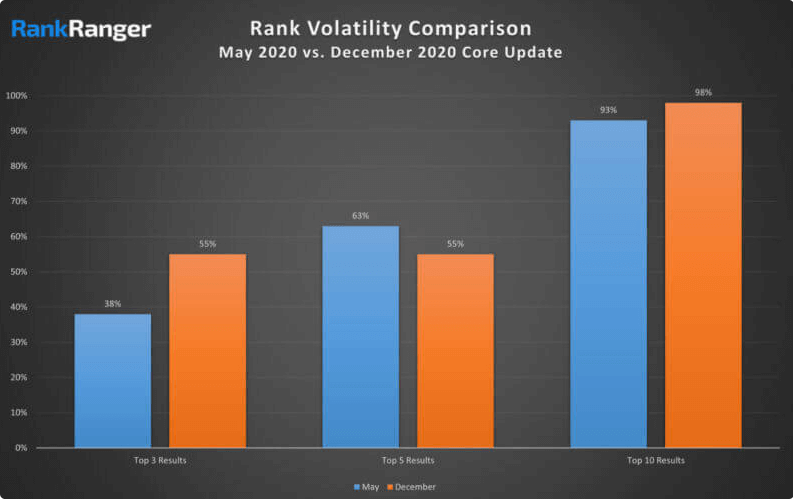
The SEMRush sensor tracking tool shows that Friday, December 4th was the day when the update’s changes were most felt. The most affected industries for the desktop search were health, real estate, finance, travel, law and government. For mobile search, the most affected categories were law and government, jobs and education, pets and animals, real estate.
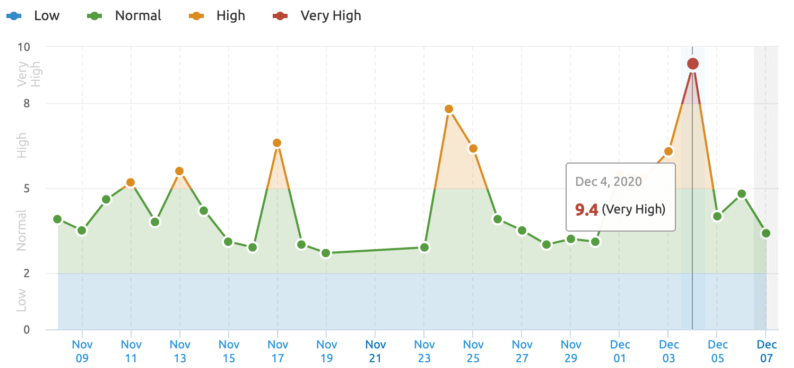
The SEO community had information to share around this update in online discussion forums and social media. Some SEO experts said that they had experienced a major drop in their organic traffic equal to 40%, others saw an increase of organic traffic over 150%.
We care about releasing Google’s major updates because they change the core search algorithm. This means that your website can perform better or worse in the search results by ranking higher or lower. It is essential to stay informed regarding Google’s updates and what they do. Keep an eye on your Google Search Console, your search rankings, and your content.
Next, we will discuss what to focus on and how to recover after Google’s core update hit. We will offer you some insightful tips to ensure that you don’t have to worry when future core search algorithms change.
How to Recover After a Core Update Hit?

Google strives to improve its algorithm and offer the best user and search experience possible. Every time an update is rolling out, on Google Search Central they provide consistent advice on preparing for changes in ranking and search updates. The advice is simple:
- Create high-quality content that follows the best practices in your industry.
- Have a structured data/site architecture that helps search engines and users discover your most relevant content for search queries.
- Fix any SEO issues that might disrupt the smoothness of the user experience.
Our advice is to wait for the update to fully roll out before making any significant changes to your website.
Focus on Your Content
The quality of your content has an impact on users. Your content marketing strategies should focus on quality issues. We recommend you update your content frequently. This means reviewing your old content by adding new paragraphs, rewriting landing pages, a blog post, adding links, and deleting irrelevant information. What we mean by this is to make sure that your website has more relevant content than your competitors, and here is what you can do to ensure you have fresh content that attracts your target audience:
- When your content is no longer relevant to your readers, we suggest deleting the page, creating a 301 redirect to your most relevant URL on your website, or updating the page to make it relevant again.
- Add infographics, step-by-step guides, videos, links or images to make your post more valuable to your audience.
- Check the health of your links. If you find any broken links, fix them. Dead links create a poor user experience.
- Focus on keyword research. Find five main keywords that each blog post ranks for and Google those terms. Identify what the top 10 ranking pages have and you don’t.
- Write your content in a simple and clear way for everyone. Avoid fluffy and complex words that no one can understand.
- Look for specific problems that people are facing. Take a look at “People also Ask,” Reddit and Quora.
- Make sure you don’t have any duplicate content. If you find duplicate content, we advise you to merge it and create a 301 redirect URL.
- Fix any page with thin content. Maybe not all of your pages need more words, but those that should be more in-depth need an immediate fix. If your message gets across only with the help of images and videos, that might be enough. Focus on user experience.
- Compare your pages to your competitors. See what kind of pages are ranking on page 1, what types of links are in their content, is their content focused on user intent, do they have more content than you have? This will give you an idea about your future actions on expanding your pages.
- Analyze if your page is worth keeping and if it adds value to your users, or you can make it more relevant by updating it. If you consider that it needs to be deleted, delete it and create a 301 redirect to a similar page on your website.
Fix SEO errors
Pages with SEO errors have a greater impact on decreasing your rankings, and those are the ones that will get a hard hit in case of an algorithm update. The SEO error that had the most impact on hurting websites are the pages with duplicate title tags and meta descriptions. Take a look at your Google Search Console profile and see what kind of errors your website is returning. Analyze the report and act based on the findings.
Take a Look at Your Link Profile
Links are a ranking signal. When a core update negatively impacts your website, analyze the websites that link back to you and the sites you link back to. Our advice is to remove every link that comes from spammy websites or sites with suspicious content.
As you can see, Google’s core updates are to be taken seriously by website owners, marketers and content publishers to improve the content quality, relevance and to pay attention to user signals. Those who were hit by an update must reevaluate their content strategy and incorporate SEO into their digital marketing plans. Every piece of content is influencing the faith of your website.
Our Advice on How to Protect Your Website from Being Hit by a Google Core Update

The key to a successful business is to offer a flawless user experience. Website performance optimization is the tool to achieve the results you want and to keep your customers happy. Good SEO, content marketing, site speed and user experience are the most important factors that will keep you from being hit by a core update.
Our advice is:
- Start by reading Google’s Quality Raters’ Guidelines.
- Read Google’s Core Update blog post and recommendations.
- Evaluate your website pages and determine which are ranking well and which ones used to rank but no longer do.
- Conduct keyword research and analysis on your competition for the selected keywords. Look at what type of sites are ranking on the first page on Google SERP.
- Try A/B testing on content and see which one is preferred by your audience.
- Show your expertise that could be valuable to user searches.
- Write your content based on the academic document (include headings, sections, sub-sections, introduction, body and conclusion).
- Focus on user intent and local search.
- Make sure you have a great website speed.
- Your website should be 100% user-oriented.
If you need help with website performance optimization and SEO, we are a team of experts that can guide you and work with you to make sure your website is bulletproof against Google core update hits. Contact us, and let’s make sure that your business brings outstanding results, no matter what search and ranking algorithm changes are on the way.
Frequently Asked Questions
The updates are necessary to improve the user experience, reward the websites that perform great and offer quality and relevant content to online users.
Your website is not penalized after a core update has rolled out. Being “hit” means that the systematic changes in Google search and ranking algorithm affect your website’s visibility and organic traffic. It cannot be fixed immediately.
No. If you were hit, you should take action immediately.
Not really. We do not receive any word before an update. Only the core updates are made public when they are about to start.